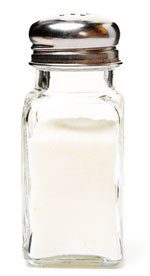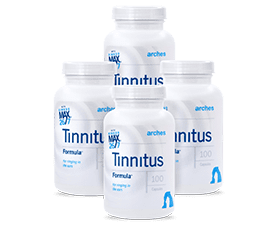By Barry Keate
Barry Keate, has lived with tinnitus over 40 years and has published 150+ research articles on numerous aspects of tinnitus. He is an expert on the condition and a well-known advocate for those with tinnitus.
Salt is essential for all animal life on earth. It is one of the oldest and most frequently used food seasonings and saltiness is one of the basic human tastes. It is an essential nutrient and serves vital purposes in the human body. But what happens when we consume too much salt? And why should people with tinnitus pay particular attention to the amount of salt we eat? Here we will examine why excess salt consumption aggravates tinnitus and what we can do about it

First it will be helpful to understand how salt interacts with the human body.
Salt, in its normal form, is composed of sodium and chlorine, which combine to form sodium chloride, or NaCl. It is the sodium in salt with which we must be concerned. Sodium makes up 40% by weight of ordinary table salt. The World Health Organization recommends that adults should consume less than 2,000 mg of sodium per day. This equates to about 5 grams of salt, or a little less than one teaspoon. The American Heart Association recommends no more than 1,500 mg per day. Most Americans consume over 3,400 mg of sodium every day! This has significant consequences for our health and for the management of tinnitus.
It is estimated the body requires less than 500 mg sodium per day to perform its functions, an amount much lower than what the average American consumes.
Sodium and the Kidneys
The body removes excess fluid by filtering the blood through the kidneys. Here the extra fluid is filtered out and sent to the bladder to be removed as urine. (1)
The kidneys use osmosis to do this. Osmosis is the process by which molecules move through a semi-permeable membrane to equalize pressure. This requires a delicate balance of sodium and potassium in the kidneys that facilitates the transfer of fluid from the blood to the kidneys.
High Blood Pressure and Hypertension
When salt is consumed in large quantities the amount of sodium in the bloodstream is raised and ruins the delicate balance with potassium. This reduces the ability of the kidneys to remove the fluid. The result is higher blood pressure (hypertension) due to the extra fluid and extra strain on the small blood vessels leading to the kidneys.
Over time, this extra strain can damage the kidneys and cause kidney disease. This reduces the kidneys ability to filter unwanted and toxic waste products, which then start to build up in the body.
People with high blood pressure are often treated with diuretic medications. This promotes the kidneys to remove more fluid from the bloodstream. Because excess sodium counteracts this effect, reducing salt intake will make blood pressure medication more effective.
Hypertension and Tinnitus
There is no doubt that increased sodium consumption leads to hearing loss and tinnitus. One study showed a clear and significant association between hypertension and a decrease in hearing. Hypertension is an accelerating factor of degeneration of the hearing apparatus during aging. This is called presbycusis. (2)
Excess sodium causes high blood pressure, which constricts the flow of blood and prevents adequate blood flow to the cochlea. Hypertension is a proven trigger of tinnitus and vertigo. (3)
People with Meniere’s disease are also required to reduce sodium intake. Although the root cause of Meniere’s remains unknown, symptoms are thought to be produced by an increase in fluid pressure in the inner ear. The primary treatment for Meniere’s is aggressive salt restriction, sometimes in combination with a diuretic, or water pill. Sodium intake should be reduced to less than 2,000 mg of sodium per day. (4)
I know that if I eat a salty meal or have salty snacks, my tinnitus will immediately increase and stay elevated for several hours until my body processes the extra sodium and returns to balance.
Hypertension also leads to many other ailments, including an increase in the risk of heart attacks and strokes in susceptible populations. One study clearly showed an association between hypertension and impaired cognitive function due to reduced blood flow to the brain. (5)
Sources of Sodium in Our Diet
The largest contributor to sodium consumption is not from the saltshaker on the dinner table. Approximately 77% of the sodium we eat comes from sodium added to processed foods and restaurant foods. Food manufacturers intentionally add salt to processed foods to prolong shelf life. Another 11% comes from cooking and table use and the rest is what is found naturally in foodstuffs. (6)
Pre-packaged and processed foods, breads and rolls, pizzas, cured meats and other packaged foods contain high levels of sodium. One can of soup can contain up to 940 mg of sodium, over half of the daily recommended intake!
The American Heart Association lists 6 common foods that are frequently eaten by Americans  and are very high in sodium and which should be avoided. These include:
and are very high in sodium and which should be avoided. These include:
1 – Breads & Rolls,
2 – Cold Cuts & Cured Meats,
3 – Pizza,
4 – Processed Poultry,
5 – Soups,
6 – Sandwiches & Burgers
People with hypertension should stay away from pre-packaged and processed foods as much as possible. Whole foods, prepared at home, with little or no canned or packaged food is the best way to maintain healthy blood pressure.
Is Sea Salt or Kosher Salt Better for Tinnitus?
Sea salt is obtained directly from the evaporation of seawater. It is usually not processed or undergoes minimal processing so it retains trace levels of minerals like magnesium, potassium, calcium and others. The crystals are substantially larger than refined table salt.
Table salt is mined from salt deposits and then processed to produce a fine texture so it can be easily used in recipes. Processing strips table salt of any minerals it may have and additives are usually added to prevent clumping or caking.
Sea salt has recently boomed in popularity in restaurants and grocery stores. Many people prefer it over table salt due to its coarse, crunchy texture and stronger flavor.
However, the difference in sodium content between sea salt, kosher salt and table salt is minimal. They are all sodium chloride and contain 40% sodium by weight.
Sea salt and kosher salt have larger crystal sizes than table salt so fewer crystals will fit in a teaspoon. Therefore, a teaspoon of sea or kosher salt may contain less sodium but sodium is the same percentage by weight.
Managing Potassium in Your Diet
We discussed earlier that balance between sodium and potassium in the kidneys is crucial to removing excess fluid and keeping blood pressure in a healthy range. It is possible to reduce some of the effect of too much sodium by consuming a diet high in potassium. The more potassium we eat, the more sodium we pass out of the body through urine. Potassium also helps relax blood pressure walls, thereby lowering blood pressure.
While most Americans consume more sodium than is good for them, we get much less potassium than we need. The recommended intake for an average adult is 4,700 mg per day. On average adult males consume 3,200 mg per day and females even less at 2,400 mg per day. (7)
The DASH Diet (Dietary Approaches to Stop Hypertension) recommends a diet rich in fruits and vegetables, fat-free or low-fat milk, yogurt and milk products, whole-grain foods, fish, poultry, beans, seeds and unsalted nuts. These are all low sodium, high potassium foods and will help lower blood pressure.
It is possible to get too much potassium. Elderly people and those with kidney disorders are most susceptible to this. As we get older our kidneys become less able to remove potassium from the bloodstream. So talk to your healthcare provider before taking any over-the-counter potassium supplement.
In the meantime, if you’re enjoying an evening TV program, munching down the chips and wondering why your ears are ringing so loud, it may be the chips. Try a banana or some dried apricots, both foods low in sodium and high in potassium.
References:
1 – Blood Pressure UK http://www.bloodpressureuk.org/microsites/salt/home/whysaltisbad/saltseffects
2 – Agarwal S, Mishra A, et al. Effects of Hypertension on Hearing, Indian J Otolaryngol Head Neck Surg. 2013 Dec; 65(Suppl 3): 614-618.
3 – Yang P, Ma W, et al. A Systematic Review and Meta-Analysis on the Association between Hypertension and Tinnitus. Int J Hypertens. 2015; 2015: 583493.
4 – University of Maryland Medical Center http://umm.edu/programs/hearing/services/menieres-disease/
5 – Fujishima M, Ibayashi S, Fujii K, Mori S. Cerebral Blood Flow and Brain Function in Hypertension. Hypertens Res. 1995 June; 18(2): 111-7.
6 – Wikipedia https://en.wikipedia.org/wiki/Salt
7 – American Heart Association
http://sodiumbreakup.heart.org/sodium-411/what-about-potassium/
Get Free Shipping!
Order now and get free shipping on either the Tinnitus Starter Kit or Combo Pack. Try the doctor recommended products with clinically proven ingredients for tinnitus. No coupon code required.

